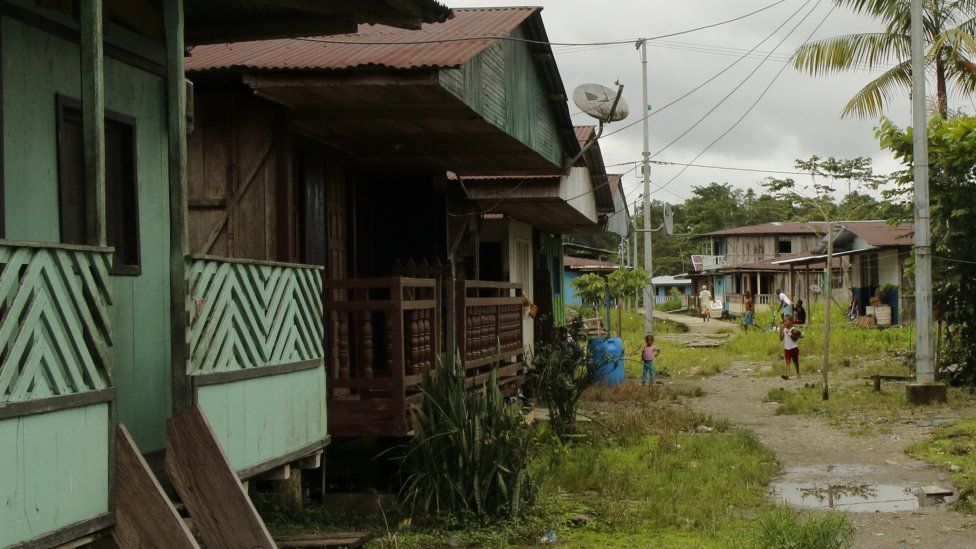Caught in the crossfire of armed gangs in Colombia
- Published

"You get so nervous you don't know if to run and hide or what to do; we went into the kitchen and hid behind the freezer in the hope that it would protect us," María (not her real name) recalls of the time she and her family were caught in the crossfire between two armed groups.
Like every weekend, María was visiting her parents in Iscuandé, a municipality on Colombia's Pacific coast.
María and her relatives were in the family's stilt house, typical for this region criss-crossed by rivers, when a speedboat carrying armed men came up the river.
María does not know who the armed men in the boat were, but she does know who started shooting at them from the hill behind her family home: ELN rebels.
The ELN, or National Liberation Army, is Colombia's second-largest guerrilla group, and despite being engaged in peace talks with the government, the group is still very much active.
About 50 ELN rebels had surrounded the family home without María noticing.
'They put a rifle to my head'
"I had never seen a shot being fired before, I had heard [shots fired], but had never seen bullets flying; they passed underneath my house, by the sides, everywhere."
"The children were crying, my father, too, we were all crying," María says.
She started praying but the ELN rebels came into the house and took her and her family up into the hills.
The rebels accused her of stashing weapons for the armed group in the speedboat, which María denied.
"They put a rifle to my head, to my father's head, to the children's heads."
Eventually, four hours after the shoot-out had started, the rebels let the family go.
Scared of returning home, the family moved from their home on stilts to the main town, along with 31 other families from the area where the shoot-out happened.
María and nine other members of her family now live in two rented rooms and share two mattresses.
Her father has not been able to work because it is too dangerous to go back to the forest where he made a living logging.
"I am worried, I don't know how we will survive," María says.
'War has started'
And she is not the only one. Dozens more families here have been forcibly displaced by a surge in violence in areas formerly controlled by the Revolutionary Armed Forces of Colombia (Farc).
The Farc signed a peace deal with the government last year and their members are demobilising in "transition zones", where they are handing over their weapons to United Nations monitors.
But with the Farc no longer in control, other armed groups are trying to take over their profitable cocaine smuggling and illegal gold mining rackets.
The groups clash with each other and the security forces.
"A war has started in the areas where the Farc used to be," says local government official Luis Enrique Sinisterra.
Nationwide, the levels of violence may have dropped as a result of the Farc peace deal, but the picture here is a different one.
Mr Sinisterra says he is not surprised by the rise in violence in Iscuandé.
He argues that what is needed is a stronger presence by the national government. He is not just speaking of the security forces but of investment in education, health, housing and infrastructure.
His prediction of what might happen if that investment should not be forthcoming is a bleak one: "The war will continue for a long time and lots of people will have to lose their lives."
And it is not just Iscuandé which feels abandoned by the government.
The Pacific coast is one of Colombia's poorest areas.
It is the area to which slaves brought from Africa escaped to until slavery was abolished, and the heart of the present-day Afro-Colombian community.
Now it is is seeing a new and menacing influx, one of armed groups keen to take hold where the Farc retreated.
- Published8 February 2017